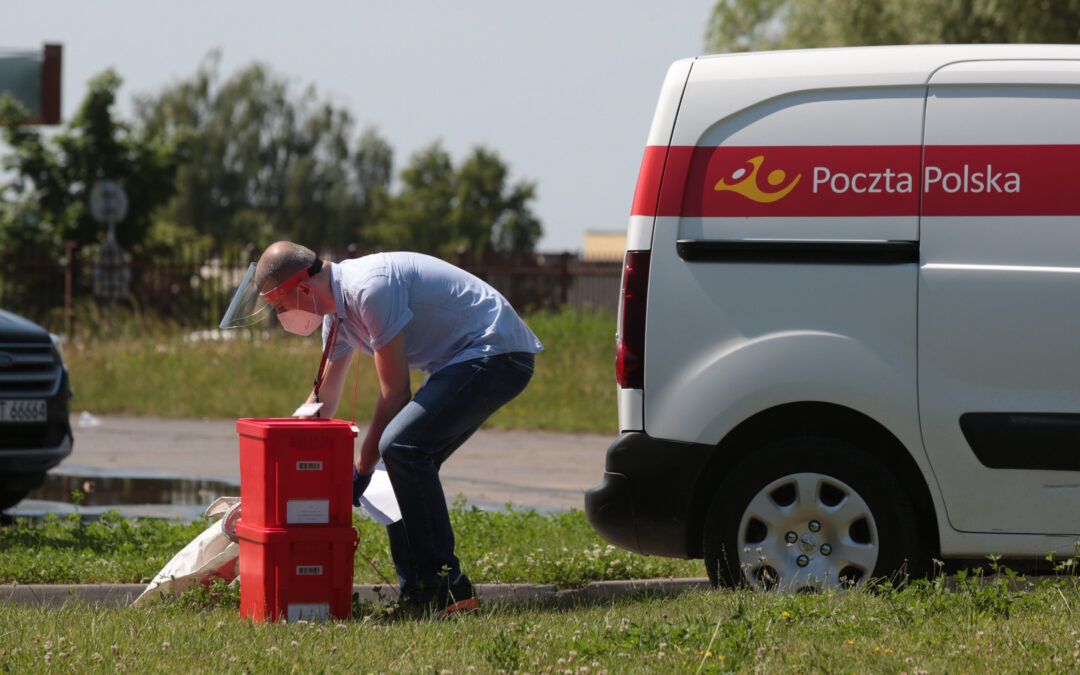Poland’s postal service, Poczta Polska, has announced that it is seeking state compensation for the costs it incurred in preparing for May’s abandoned presidential election.
The government had pushed to hold an entirely postal vote due to the pandemic. However, a last-minute political deal saw it eventually abandon the idea, meaning that the election was declared void.
In the meantime – and before legislation authorising an all-postal vote had passed – the prime minister had already issued an order for the state-owned postal service to begin preparations. A recent court ruling found that he committed a “gross violation of the law” by doing so.
Leaked documents have previously revealed that the post office alone spent at least 70 million zloty (€15.4 million) on preparations for the election. Now, its spokeswoman, Justyna Siwek, has confirmed to TVN24 that the company is taking “legal steps to benefit from compensation”.
“Poczta Polska operates in accordance with the law…it is not the creator of the law,” Siwek told TVN24. “Poczta Polska was ordered to perform certain activities in order to prepare for the handling of elections. We carried out these actions and we act within the limits of the existing law.”
The post office has, however, refused to confirm the amount that it spent on preparations, nor how much it is now seeking in compensation. “We have already explained that all matters related to contracts and amounts are legally protected secrets,” says Siwek.
The application for compensation can be made under the terms of legislation passed in August, known as the “Covid Law”.
It relates mainly to the functioning and regulation of healthcare during the pandemic, but it also includes the possibility of compensation for entities that implemented the prime minister’s order to prepare for the May presidential elections.
The opposition sought in parliament to reject the amendment allowing such compensation to be paid, but it was pushed through with the votes of the ruling Law and Justice (PiS) party and its allies.
Poczta Polska informed the National Electoral Office (KBW) on 1 September that it will apply for compensation for costs incurred in organising the election. However, the KBW said this week that it has received no further details other than the initial notification.
The post office must come to an agreement with the head of the National Electoral Office to specify the amount of compensation and the date of its payment, reports TVN24.
That deal must then be assessed by the Office of Electronic Communications and the General Prosecutor’s Office, two government bodies. Any compensation eventually paid will come from state funds.
The run-up to the planned election in May was fraught with chaos and controversy, as the Polish government pushed ahead with preparations for a fully postal vote before relevant legislation had been passed.
Many local authorities refused to cooperate, on the basis that doing so would be illegal. Speaking at the time, Piotr Moniuszko, chairman of the Free Trade Union of Postal Workers, called the preparations “wasted money” and questioned who would cover the costs.
However, the government argued that it had a legal and constitutional obligation to ensure that the election took place. It accused the opposition of deliberately delaying the necessary legislation.
Poland’s postal election enveloped in confusion as government pushes ahead before legislation passed
After a court in Warsaw ruled earlier this month that the prime minister had violated the law and the constitution by ordering the post office to prepare for the elections, government spokesman Piotr Müller again defended their actions, pointing to the “unprecedented’ situation caused by the pandemic.
“[The prime minister] decided to hold the election…[using] the safest form of voting and within the deadline provided for by the constitution,” said Müller.
The ruling party has been seeking to pass a new law that would give legal immunity to public officials who break (or have already broken) the law in order to tackle the pandemic.
The legislation has, however, failed to so far win the support of PiS’s junior coalition partner, United Poland (Solidarna Polska), resulting in it recently being withdrawn from a planned vote in parliament.
Main image credit: Pawel Malecki / Agencja Gazeta

Juliette Bretan is a freelance journalist covering Polish and Eastern European current affairs and culture. Her work has featured on the BBC World Service, and in CityMetric, The Independent, Ozy, New Eastern Europe and Culture.pl.




















